Local delights to set more taste buds tingling
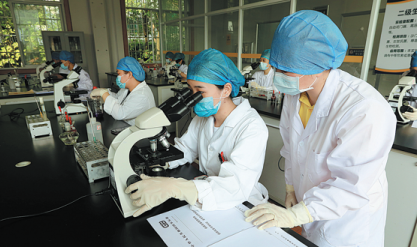
Students examine products in a laboratory at the luosifen industry school in Liuzhou, Guangxi Zhuang autonomous region. CHINA DAILY
New alliance aims to produce innovative products, promote sales
Chewing spicy gluten strips while eating a bowlful of luosifen, or river snail rice noodles, poses a tough challenge for the taste buds.
One woman who sampled this food said she experienced an intense flavor and it was as if 1,000 tiny firecrackers had exploded simultaneously in her mouth.
More such food is poised to reach the market after nine educational institutions training workers to produce snacks with local characteristics joined a new alliance formed in Liuzhou, Guangxi Zhuang autonomous region, in June. The dishes will likely include zongzi, or sticky rice dumplings, stuffed with luosifen, and crawfish luosifen.
The alliance aims to produce innovative products to promote sales and widen brand influence.
Gan Jinming, president of Liuzhou Vocational and Technical College, which is one of the initiators of the alliance, said the institutions will explore an effective way to equip young workers with skills, develop industry with local characteristics, and drive the regional economy.
"The 14th Five-Year Plan (2021-25) encourages the development of characteristic industries based on local conditions. The alliance aims to help train more high-caliber talent to serve industrial development," Gan said, adding that it will promote regional cooperation in education, production and the sharing of market resources.
The nine members of the alliance comprise the college's luosifen industry school, Qianjiang Crayfish College in Hubei province, the zongzi industry school in Hechi, Guangxi, a school in Pingjiang, Hunan province, that specializes in spicy gluten strips, and schools focusing on local noodles in Yibin, Sichuan province, and in Baoji, Shaanxi province.
Chen Huan, head of the ranmian, or "burning noodles", school at Yibin Vocational and Technical College, said the school wants to learn from its luosifen partner how to develop new products, run a business, build brands, and how the industry school is run. By joining the alliance, the Yibin college also wants to establish exchanges with other industry schools and companies.
Ranmian noodles are spicy, water-free, heavy in oil and are mixed with crushed peanuts and pickled leaf mustard. The dish, a specialty in Yibin, is a Sichuan provincial intangible cultural heritage.
Promising industry
More third- and fourth-tier cities are working to upgrade traditional street food into a scaled industry as party of efforts to boost the economy and raise awareness of such dishes.
They face challenges in building reputable brands, innovating diverse products and increasing efficiency through automated production. Experts said that, as in many other industries, training professionals is a good way to achieve sustainable development.
At a class on luosifen quality control at the industry school in Liuzhou, students were asked to appreciate and assess a bowl of luosifen. Yu Qiaoling, the teacher, told the class, "See it, smell it and feel the elasticity in your mouth."
Chemical analysis followed this sensory evaluation. At another class, students learned and practiced skills to promote products through livestreaming.
One student proclaimed, "The new luosifen product has an intense flavor and only costs 9.90 yuan ($1.53) if you place an order via our broadcasting room."
China's first luosifen industry school was established at Liuzhou Vocational and Technical College in May last year, and soon went viral online, attracting more than 230 million views on Sina Weibo.
According to Gan, the college president, the school enrolls about 500 students annually for seven majors covering the entire food industry chain, from production, quality inspection and equipment maintenance, to advertising, marketing, e-commerce and chain operation management.
Significant progress has been made. The school, helped by some companies, has developed an automated packaging production line, a big data technological information service center, a product innovation center, a quality security control and inspection center, a talent training base and a culture and media service base. It also boasts a livestreaming room and photographic studio for students to learn to promote products online.
Outside the meeting room where the alliance was launched, students at the school displayed a robot they produced that can cook a bowl of luosifen in two minutes. They also promoted the latest brand created on campus.
After graduation, students at the school, which was established by the local government, Liuzhou Vocational and Technical College and companies, are recommended to employers.
The school has opened an apprenticeship class with Guangxi Hugui Food Group to train e-commerce students for the company. It also provides training classes for workers outside the college.
Liu Cong, a student in the apprenticeship class, told chinanews.com the luosifen industry is highly promising. "The courses combine theory and practice, and we can work at a luosifen company after graduation, which means I don't need to worry about looking for a job," Liu said.
A national intangible cultural heritage and pillar industry in Liuzhou, the output value of the local luosifen trade rose from 500 million yuan in 2014 to 20 billion yuan this year. The number of luosifen restaurants and related online stores based in Liuzhou has reached about 10,000 and 15,000 respectively, according to the local authorities.
Daily output of prepackaged luosifen in Liuzhou reached 5.01 million packets, with sales of more than 9.1 billion yuan from January to June-the latter a year-on-year rise of about 82 percent, data from the Liuzhou Customs authorities show. Offline restaurant sales stood at 9.72 billion yuan. Luosifen exports from January to May to markets such as the United States, Australia, Singapore and European countries reached 9.8 million yuan.
Wei Yangnian, general manager of Guangxi Zhongliu Food Technology Co, said the company started out as a family workshop, but it lacks experienced workers with good educational backgrounds. It is cooperating with the luosifen industry school to train workers.
"The school will also help us train high-level professionals, especially e-commerce talent and food engineers," Wei said.
The company's luosifen production used to be carried out manually, and recruitment advertisements were pasted on walls seeking unemployed women to work on its assembly lines. Now, with automation accounting for 80 percent to 90 percent of production, the company needs more managers, technicians and food quality control experts. "We plan to recruit 10 postgraduate students this year," Wei said.
Employees are also urgently needed by the company for its new factory, which is due to open in the middle of next month.
Students from the school will work as interns at the company next month, and Wei said he believes this intake can meet demand.
The company also works with the luosifen industry school to develop new flavors, packaging design and e-commerce. "Cooperation between companies and schools helps promote development of the industry," Wei said.
Professionals needed
Answering queries about the local crawfish college, Gong Dingrong, former mayor of Qianjiang, told media outlets in an earlier interview, "There are many kinds of talent, some of which can launch a satellite, but cannot necessarily cook crawfish."
Gong said that just as professional knowledge is required to construct a spaceship, professional talent with a knowledge of aquaculture, cooking, marketing and restaurant management is needed to provide quality crawfish for diners. In view of this, it is reasonable to set up a major to train workers in the industry.
Crawfish, a pillar industry in rural Qianjiang, is a popular nighttime snack in China. In 2017, Jianghan Art Vocational College and a number of companies cooperated to open the Qianjiang Crayfish College to cater to industrial development and rural vitalization.
The college, which has 428 students, runs four majors-culinary craft and nutrition, catering management, marketing, and aquaculture.
The students do not have winter or summer vacations. Instead, they study the crawfish industry. When business is slow, they learn theory in class, and during the peak season they work as interns at restaurants.
Wang Zhongqiu, vice-president of the college, said: "Some people don't understand this. The students not only learn to cook crawfish. We have 28 courses in the three-year study period, including English, law and different types of Chinese cuisine such as Sichuan and Xiang (Hunan).Crawfish is just our focus."
He added that about 80 percent of the graduates work for restaurant chains or hotels as cooks, sales staff members or managers, while others start their own businesses. Some of them earn more than 10,000 yuan a month. "The market response has been quite good," Wang added.
"The (vocational education) major needs to meet the demands of local industry. In addition, students should have more than just one skill. We need to comprehensively educate them and equip them with innovation skills. We encourage and support entrepreneurship, so that such talent can receive wider social recognition," Wang said.
The college has provided short-term training for some 10,000 people with insufficient time to devote to their studies. It has also published eight books about crawfish and has helped draw up 10 standards for the industry.
A member of the new alliance, the college is cooperating with the luosifen industry school to mass produce instant luosifen with crawfish, which is particularly popular with young consumers.
Jiang Hao, a partner at the consultancy Roland Berger, said the alliance will provide a professional platform for Chinese food with local characteristics and will also team up with different sectors to create value.
"For example, together they can share resources, increase brand influence and promote marketing," he said.
Jiang added that success for many industries in China with local characteristics is due to empiricism (a philosophical perspective based on experience and observation), but the weakness of empiricism is that it is hard to measure quality.
Developing a scaled industry from a family workshop calls for a standardized production process, a complete system and the cultivation of professionals, he said.
"As China is developing better-quality vocational education, such industry schools can offer different occupational paths for students who don't follow the traditional route to university," Jiang added.
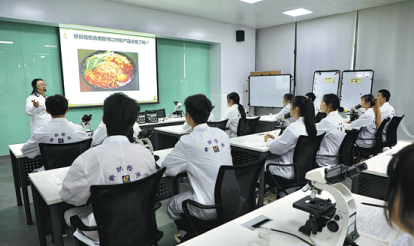
Students attend a course at the school. CHINA DAILY
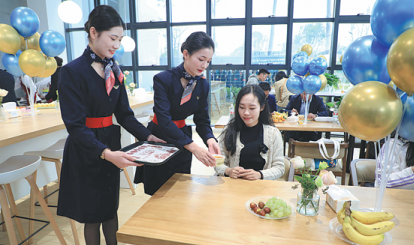
New products created by students are offered to diners at the luosifen school's canteen. CHINA DAILY
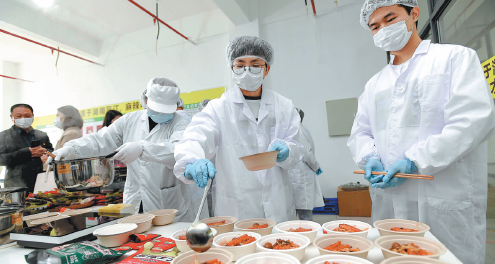
Students from Liuzhou school make spicy luosifen during a visit to a vocational school in Pingjiang county, Hunan province. YANG HUAFENG/CHINA NEWS SERVICE
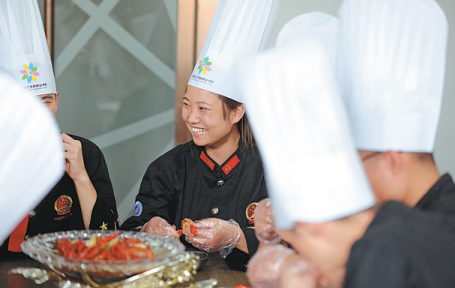
Qianjiang Crayfish College in Hubei province is one of nine members of a new alliance formed by educational institutions. NIU JING/FOR CHINA DAILY

Students from the luosifen industry school in Liuzhou livestream products. CHINA DAILY
